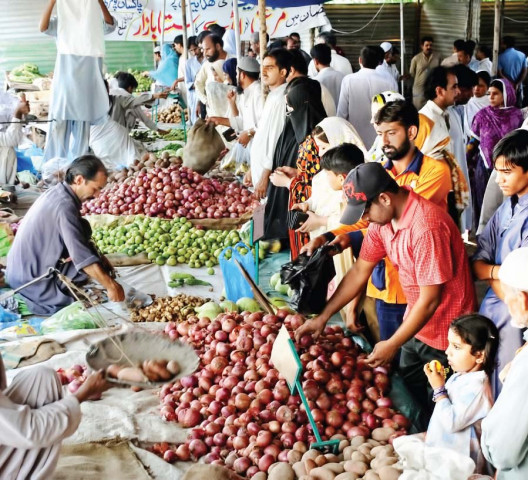Common man reels under runaway inflation
Wholesalers, retailers raise prices every week as regulators go missing

It would not be over-exaggeration to say that Pakistan has been virtually in economic turmoil with fast-depleting foreign reserves, a historic depreciation of the rupee against the US dollar, and soaring inflation.
All this is exacting a heavy toll on consumers, especially people belonging to low-income groups, who continue to struggle to make ends meet as prices of daily use items including flour, sugar, ghee, pulses, meat and milk continue to see an upward trajectory in whole and retail markets in the twin cities of Rawalpindi and Islamabad.
Interestingly, all major local and multi-national companies continue to juggle, raising prices of their products from food to non-food items including milk every week without being checked by any regulators at the federal and provincial level.
In the open market, the price of live chicken has touched Rs290 per kg while chicken meat is being sold at Rs430.
Similarly, eggs are being sold at Rs272 per dozen, mutton between Rs1,600 and Rs1,800 per kg, beef at Rs900 per kg and packed milk between Rs220 and Rs230 per litre.
Yogurt is being sold at Rs190 per kg, chickpeas at Rs300, banaspati ghee at Rs500, cooking oil at Rs530 and rice at Rs290 per kg. The rate of potatoes has climbed up to Rs200 per kg, onion up to Rs220, tomatoes Rs240, pea Rs200, garlic Rs300, ginger Rs340, green chilies Rs120, capsicum and lemon Rs100 each, brinjal Rs60, bitter gourd Rs80, and the price of arvi has reached R110.
As there is no check on the sale of daily use products of the multinational companies, different brands of milk have increased prices up to Rs230 per litre.
With the increase in the price of tea, the quantity of boxed tea has also been reduced. A box of tea was available for Rs290 per 190 grams a week ago but now its price has not only been increased to Rs370 but its weight has also been reduced from 190 grams to 170 grams.
The same has been done with ghee and oil prices. The price of one liter of oil was Rs500 which has been increased to Rs530 and its weight has been reduced from 1 liter to 900 grams.
District Market Committee Chairman Chaudhary Imtiaz Ahmed said that they were authorized only to set official price rates but they cannot implement these official prices.
“Unless the district market committees are empowered to implement the official rates, artificial inflation cannot be eradicated. We have asked for this option many times but it has turned on a deaf ear,” he said.
President of Anjuman Tajiran Sabzi Mandi Ghulam Qadir Mir said that every retailer and wholesaler now fixes his own rates without being checked by any regulator.
“There are 60 price control magistrates in the Rawalpindi district but they are not functioning. Their staff and official only visit markets and go back without ensuring the official rates are enforced,” he said.

1724319076-0/Untitled-design-(5)1724319076-0-208x130.webp)

















COMMENTS
Comments are moderated and generally will be posted if they are on-topic and not abusive.
For more information, please see our Comments FAQ